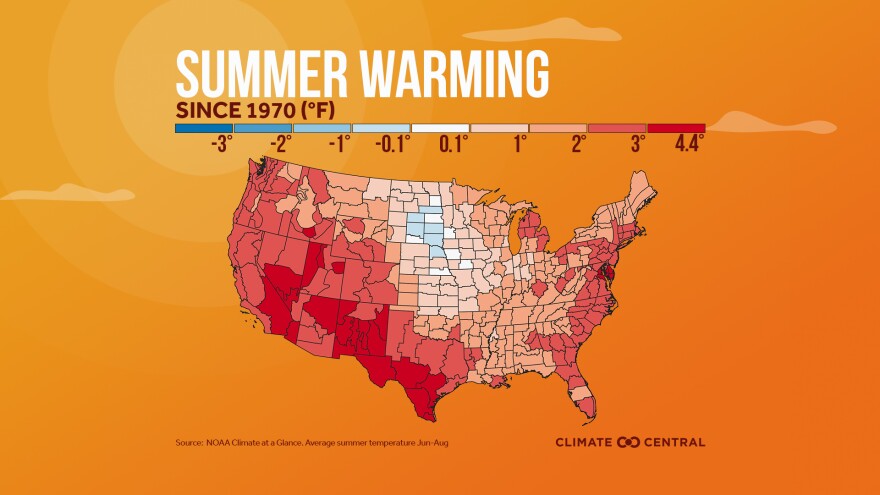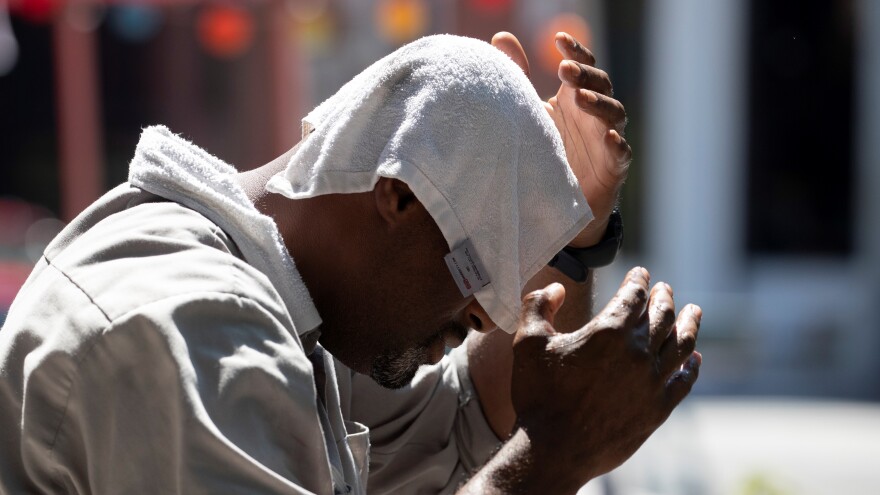Climate change is leading to rising summer temperatures across most of the U.S., including in Jacksonville, according to Climate Central. On top of that, dangerously hot days are becoming more common and record-breaking heat events are happening more frequently.
To mark the first day of meteorological summer, June 1, Climate Central analyzed 51 years of summer temperature data in 246 U.S. locations.

According to the data, about 95%, or 233, of those locations experienced an increase in their average summer temperature, with 50% (122) seeing increases of 2? or more.

In Jacksonville the average summer temperature has risen by about 1.1? since 1970. Nine out of the top ten fastest-warming summer locations were in the Western U.S.
Summer night temperatures increased by 2? or more in 61% of the evaluated locations and by about 1.6? in Jacksonville.

Extreme heat is the deadliest type of hazardous weather for humans, according to the National Weather Service.
Hotter summer temperatures can lead to health issues like heat stroke and other heat-related illnesses. These issues are even more prevalent in already vulnerable populations, like seniors, younger children and low income people who can’t afford air conditioning.
Related: Warming Brings Muggier Weather To Jacksonville, Threatening Most Vulnerable
Summer heat can also lead to poor air quality by trapping pollutants close to the earth’s surface and creating ground-level ozone. These pollutants can make respiratory problems worse in people with asthma and other lung diseases.
In homes without air conditioning, warmer nights mean bodies will have more trouble cooling off and recovering after intense heat events. One study found that warmer nights can make it harder to get a good night's sleep.
Related: Report: Increasing Number Of Hot Days Threatens Health Of Florida’s Outdoor Workers
Cities tend to be hotter than surrounding suburban and rural areas due to what’s known as the urban heat island effect, which is caused by a higher prevalence of heat-absorbing surfaces and materials like roads and buildings. Studies have found that this phenomenon disproportionately affects minority and low-income communities, which often have less shade-covering trees than whiter, more affluent neighborhoods.
As WJCT News partner The Florida Times-Unionreported last year, summertime temperatures in Jacksonville neighborhoods that were discriminated against under redlining policies roughly a century ago are nearly 10 degrees hotter than in tree-heavy, historic neighborhoods like Avondale, Ortega Terrace, Venetia, San Marco and Granada.
Related: Mayport, Other Bases Could See More Hot Days If Emissions Continue Unchecked
About 38% of the locations Climate Central looked at reported at least an average of one additional week of extremely hot temperatures (above 90?) every year when compared to 1970 and 59% reported an annual increase of at least three days.

Jacksonville is experiencing 4 more days with temperatures above 95? when compared to 50 years ago.
Miami reportest the largest change with 79 additional days above 90?.
Brendan Rivers can be reached at brivers@wjct.org, 904-358-6396 or on Twitter at @BrendanRivers.





